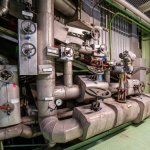The Future of Electric Vehicle Motors: Innovations, Manufacturing, and Automation
Electric vehicles (EVs) have been at the forefront of sustainable transportation, and a key component driving their success is the electric motor. As we move toward a more environmentally conscious future, the development of electric vehicle motors has become a focal point of innovation and advancement. In this blog, we’ll take a look at the current state of electric vehicles, the manufacturing processes involved, and how they’re contributing to the automation equipment industry.
The Current Landscape
Electric vehicles rely on electric motors to convert electrical energy from the battery into mechanical energy to propel the vehicle. The most common type of electric motor used in EVs is the permanent magnet synchronous motor (PMSM). PMSMs offer high efficiency and power density, making them ideal for electric propulsion.
Innovations in Electric Vehicle Motors
Higher Efficiency
Enhancing the efficiency of electric motors is a top priority. Improved efficiency means less energy is wasted as heat, resulting in longer driving ranges and reduced energy consumption. Engineers are working diligently to optimize motor designs, implement advanced cooling systems, and develop better control algorithms to maximize efficiency.
Integration with Transmissions
Many electric vehicles currently use a single-speed transmission due to the wide torque range of electric motors. However, for larger and more powerful EVs, multi-speed transmissions are being explored. These transmissions can boost efficiency and performance by enabling the motor to operate at its optimal speed over a broader range of driving conditions.
Lightweight and Compact Designs
Reducing the size and weight of electric motors is crucial for improving overall vehicle efficiency and creating more space for passengers and cargo. Advanced manufacturing techniques, such as 3D printing and the use of composite materials, are being employed to create lighter and more compact motor designs without compromising performance.
Impact on the Automation Industry
Electric vehicle motors are not only transforming the automotive landscape but also making a profound impact on the automation industry in various ways:
Increased Adoption of Electric Motors in Industrial Automation
One significant change brought about by electric vehicle motors is the increased adoption of electric propulsion systems in industrial automation equipment. These motors offer high efficiency, precise control, and lower maintenance requirements compared to traditional combustion engines. As a result, industrial robots, automated guided vehicles (AGVs), and various types of machinery are increasingly being powered by electric motors. This shift not only improves overall efficiency but also reduces carbon emissions, aligning with the broader goals of sustainability and environmental responsibility.
Advancements in Motor Control and Automation
Electric vehicle motors have spurred advancements in motor control technology and automation systems. These motors require sophisticated control algorithms to manage power delivery, optimize efficiency, and ensure smooth operation. As a result, there has been a proliferation of smart controllers and automation solutions that can seamlessly integrate with electric motors. This progress has a ripple effect across industries, enabling more precise and adaptable automation processes, from manufacturing lines to warehouse logistics, ultimately enhancing productivity and cost-effectiveness.
Collaboration between Automotive and Automation Sectors
The convergence of the automotive and automation industries is fostering collaboration and cross-pollination of ideas and technologies. Automotive companies with expertise in electric motor design and manufacturing are partnering with automation companies to develop cutting-edge solutions for various industrial applications. This collaborative approach is accelerating the development of innovative automation equipment, paving the way for greater efficiency, flexibility, and scalability in factories and warehouses. Moreover, as electric vehicle technology advances, automation systems benefit from the continuous refinement and enhancement of electric motor technology, resulting in more reliable and efficient solutions for the automation industry.
Work With the Experts At Air & Hydraulic Equipment
Since 1971, Air & Hydraulic Equipment, Inc. has been providing unsurpassed products, expertise, and value-added services to a vast customer base that relies on hydraulic, pneumatic, electric, and automation processes throughout Tennessee, North Georgia, and Southwest Virginia.
Whether you’re interested in learning more about industrial automation or are in need of service and repair for your machine parts, our dedicated team of experts are here to help you.
Contact us today to learn more about our services.










